Students speak out after TikTok bans pop up across America
January 24, 2023
The University of Texas and Texas A&M University are two of the latest colleges to take action against the social media app, TikTok, along with thirteen other universities across the United States.
Several state governors recently issued executive orders to ban TikTok on all federal devices, including those in an academic environment and on wifi.
On Jan. 8, 2023, Mike DeWine, governor of Ohio, signed a bill banning TikTok and other Chinese-operated apps on state and government devices.
Students are starting to speak out against the government banning TikTok on campuses.
Maddie O’Halloran, a junior in journalism and public relations shared her opinion of the recent ban the Texas universities have made.
“I think it’s ridiculous. Regardless of whether it’s on a federal device or not, I feel like students should be able to go on TikTok if they want. I don’t understand why they banned it…in my opinion, it doesn’t pose any issues or any threats,” O’Halloran said.
Immediately following the edict, state employees could no longer download or use the video-sharing network on government-issued cell phones, laptops, tablets or desktop computers. Ohio is joining more than 20 states on the matter, however, a statement has not yet been issued from DeWine’s office regarding it. It is unclear whether or not public universities will be affected.
O’Halloran spoke on her opinion regarding DeWine’s new bill and how this would affect BGSU’s TikTok account. It has not been stated whether or not BGSU would be taking the initiative to ban TikTok on wifi.
“I believe that everyone would try and find a way around it. I think that there would be a lot of upset from students on campus considering TikTok is such a big thing and we view it almost every single day,” said O’Halloran.












